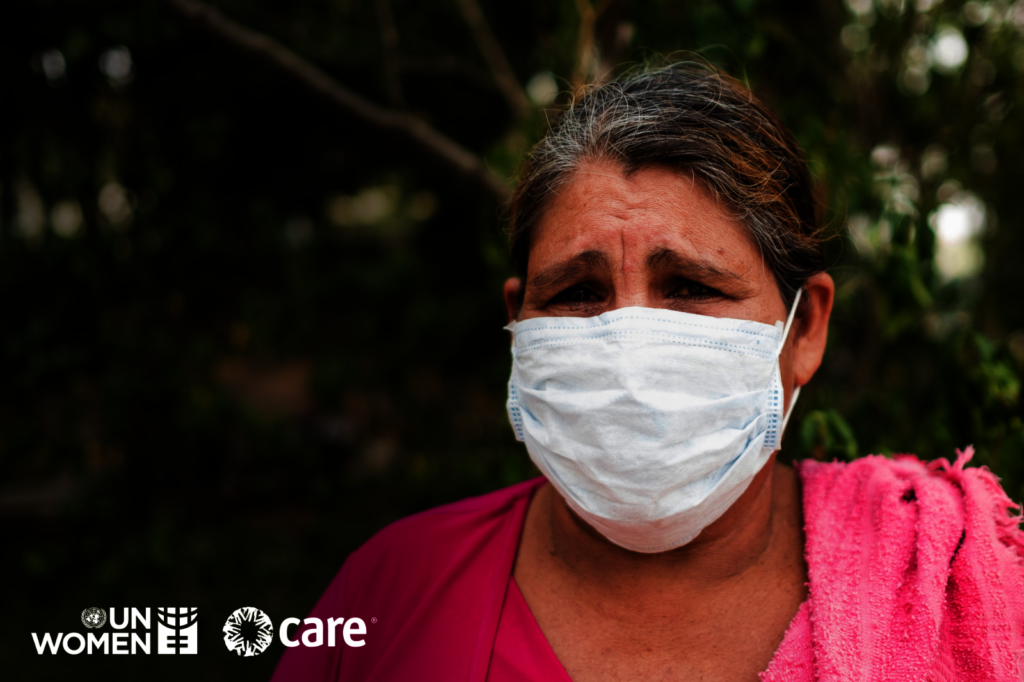By Nia Carter | Development Coordinator
The communities of Chimaltenango, Escuintla and Sacatepéquez, Guatemala continue to recover from Volcano Fuego as they face the COVID-19 crisis. Here is how CARE is addressing the needs of women and girls in Latin American and the Caribbean at this time.
Women and girls across Latin America and the Caribbean (LAC) are facing a terrifying mix of, increased domestic violence, increased care burden, lower access to income and jobs, and potential social unrest as a result of the coronavirus outbreaks finds a new CARE International and UN Women joint report.
The LAC region has the highest levels of inequality in the world, with wide gaps in living standards across countries, regions, sectors, and socioeconomic spheres. When coupled with the pervasive gender inequality that persists, the response to Covid-19 in LAC becomes immeasurably more complicated.
CARE International and UN Women joined forces in Latin America, and the Caribbean (LAC) produced a publication titled "Rapid Gender Analysis in COVID-19 Emergency in LAC", which presents a series of recommendations aimed at ensuring a more effective gender-inclusive response in the region.
The Rapid Gender Analysis (RGA) for COVID-19 is a tool designed to provide information about the different needs, risks, capacities, and coping strategies of women, men, boys, girls, and gender-diverse people during the COVID-19 crisis. This RGA is part of the iterative RGA process for the LAC region and is intended as a programming tool for humanitarian actors.
"The COVID-19 crisis is exposing and will deepen historical socioeconomic inequalities in Latin America and the Caribbean," said Tatiana Bertolucci, Regional Director for CARE USA's Latin America and the Caribbean (LAC) Region "Indigenous, afro-descendant and displaced women and girls are most vulnerable because they employed in areas such as the service sectors, which have been hit hard by the pandemic. This means that they are most likely to lose their jobs, lose their access to any income and will be less protected by social welfare systems, and let's not forget that women are also most often caretakers of the sick, elderly and kids. Because so many depend on them, women's disempowerment often has a domino effect within families and communities."
Disease outbreaks affect people of different genders differently. During these crises, under-resourced social protection and health systems are generally unable to keep up with the pace of need. This exacerbates pre-existing gender and intersectional inequalities, as it disproportionately impacts those who are already struggling to access resources – especially women, girls, and gender-diverse people from at-risk or marginalized groups. Recognizing the different ways these disease outbreaks affect people of different genders and at-risk groups are fundamental to understanding the full impacts of health emergencies and to creating effective, appropriate, equitable responses.
As the situation worsens and the economic recovery remains lengthy and uncertain, the possibility of social unrest and an increase in crime is likely to contribute to physical and sexual violence against women.
"It is important to remember that violence against women and girls was already the world's most widespread human rights violation of pandemic proportions even before the pandemic," said María Noel Vaeza, Regional Director for UN Women in the Americas and the Caribbean. "In Latin America and the Caribbean, it affects on average 1 in 3 women throughout their lives. The root causes of this violence are gender inequality and discrimination, as well as the harmful social norms and masculinities still in place and the high levels of tolerance and impunity in our societies. The Rapid Gender Analysis offers concrete, practical recommendations for gender equality in humanitarian programming."
Lockdowns have resulted in an alarming increase in reports of gender-based violence, including femicide, early pregnancy, and other forms of sexual assault and abuse. While some countries have set up mechanisms to prevent and address domestic violence, others where the situation for women and girls was already dire before the pandemic continue to deteriorate.
Women's unpaid care work and the unequal division of labor in households is being further exacerbated as COVID-19 response measures maintain schools closed along with public spaces, and care services. Women in LAC already spend almost three times as much time on unpaid care work compared to men. As public resources are stretched to their limits as a result of the emergency, States' ability to continue providing care related to the welfare system will further diminish when it is most needed, meaning women's caregiving role and hours spent will continue to grow. Furthermore, as the availability of jobs remains limited throughout the economic recovery, women will find greater challenges in accessing labor markets in terms of the burden of hours related to care work.
Given this critical context in the region, this report calls for ensuring gender equality and women's empowerment into COVID-19 response. as central to provide an effective and comprehensive approach.
Key recommendations include:
Links:
Project reports on GlobalGiving are posted directly to globalgiving.org by Project Leaders as they are completed, generally every 3-4 months. To protect the integrity of these documents, GlobalGiving does not alter them; therefore you may find some language or formatting issues.
If you donate to this project or have donated to this project, you can receive an email when this project posts a report. You can also subscribe for reports without donating.
